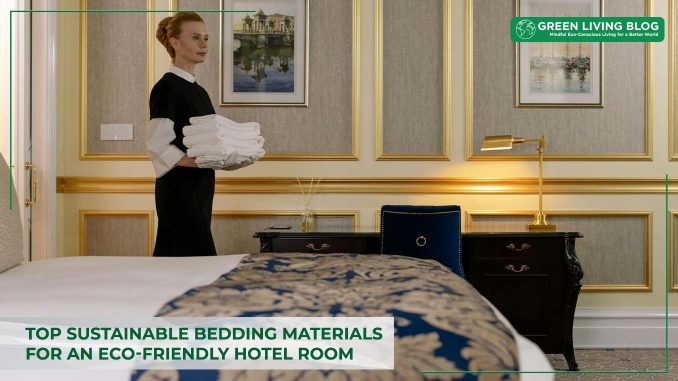
As sustainability becomes a top priority in the hospitality industry, eco-conscious travellers are increasingly looking for hotels that align with their values.
One often overlooked but impactful way hotels can reduce their environmental footprint is through their bedding choices.
Choosing eco-friendly options for your hotel duvets and bedding sets can enhance guest comfort and contribute to resource conservation, waste reduction, and long-term savings.
1. Organic Cotton

Organic cotton is a go-to material for sustainable bedding, offering a soft, breathable, and hypoallergenic option. Unlike conventional cotton, organic cotton is grown without harmful pesticides and requires significantly less water, making it a more sustainable alternative.
Why it’s great for hotels:
Hypoallergenic, ideal for guests with sensitive skin. Durable, allowing for longer use with fewer replacements. Water-saving, using up to 91% less water in production than conventional cotton.
2. Linen
Derived from the flax plant, linen is a luxurious and durable fabric that has long been favoured for hotel bedding. It’s naturally temperature-regulating, making it comfortable in both warm and cool climates, and its production requires minimal water and fewer chemicals.
Why it’s great for hotels:
Long-lasting durability means fewer replacements and lower costs over time.
Naturally wrinkle-resistant and quick-drying, which can help reduce energy costs.
Eco-friendly cultivation as flax thrives in poor soil and needs little irrigation.
3. Lyocell (Tencel)

Lyocell, often branded as Tencel, is an eco-friendly fibre made from sustainably sourced wood pulp, typically from eucalyptus trees. The production process uses a closed-loop system that recycles 99% of the solvents and water used, minimising environmental impact.
Why it’s great for hotels:
Moisture-wicking and highly breathable, providing guests with a cool and comfortable sleep experience. Biodegradable, reducing environmental waste at the end of its life cycle.
Soft and gentle against the skin, ideal for high-end bedding.
4. Recycled Materials
Bedding made from recycled materials, such as recycled cotton or down, is another sustainable option. For example, some duvets and pillows are filled with fibres made from recycled plastic bottles, offering a solution to both landfill waste and the demand for new resources.
Why it’s great for hotels:
Gives a second life to materials that would otherwise contribute to environmental pollution.
High-quality feel, offering comfort without compromising on luxury.
Perfect for hotels looking to highlight their commitment to reducing plastic waste.
5. Plant-Based Fillings

Plant-based duvet and pillow fillings, such as those made from corn fibre, are an innovative alternative to traditional animal-based products like down. These cruelty-free options are not only more ethical but also environmentally friendly.
Why it’s great for hotels:
Offers guests an option free from animal products, appealing to vegan and eco-conscious travellers. Biodegradable, ensuring it has a minimal environmental footprint at the end of its life. Soft and supportive, providing comfort without compromising on sustainability.
Why Sustainable Bedding Matters
Incorporating sustainable materials into your hotel’s bedding not only contributes to a greener planet but also enhances your guest experience. According to recent surveys, over 65% of UK travellers would prefer staying in accommodations that prioritise sustainability, and many specifically look for certifications and eco-friendly initiatives.
Eco-conscious travellers are paying more attention to how hotels align with their values, and sustainable bedding is one way to make a lasting impression. It’s a win-win: improved guest satisfaction, reduced costs, and a positive contribution to sustainability efforts.
![]()
Author Profile
- Online Media & PR Strategist
- Blogger and Educator by Passion | Senior Online Media & PR Strategist at ClickDo Ltd. | Fascinated to Write Lifestyle Blogs in News & Education I have completed a journalism summer course at the London School of Journalism and manage various blogs.
Latest entries
 BusinessOctober 29, 2025Top 6 UK Government Green Funds & Grants for SMEs
BusinessOctober 29, 2025Top 6 UK Government Green Funds & Grants for SMEs List postOctober 16, 202510 Best Green Hosting Services in the UK
List postOctober 16, 202510 Best Green Hosting Services in the UK BusinessSeptember 9, 2025Top 5 Eco Certifications & Their Impact on Greener Businesses
BusinessSeptember 9, 2025Top 5 Eco Certifications & Their Impact on Greener Businesses LeisureSeptember 2, 2025Plant-Power: The UK’s Top 10 Vegan Festivals 2025
LeisureSeptember 2, 2025Plant-Power: The UK’s Top 10 Vegan Festivals 2025






Leave a Reply
You must be logged in to post a comment.